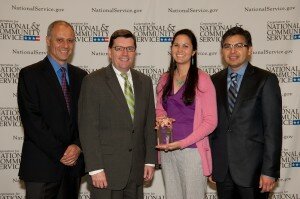Volunteers are the lifeblood of many organizations, therefore it is important to keep them engaged in their work. To keep a volunteer engaged, it is vital to provide ample recognition, rewards, and opportunities to volunteers.
Recognize volunteers publicly and privately.
Whether you are working with one volunteer, ten, or a few hundred, it’s important to recognize their efforts. There are many ways to recognize volunteers, from giving them a hand written thank you note, or one of many other ways to say thank you. Getting to know your volunteers will help you to know how they would best like to be thanked for their work.
Reward volunteers with creative gifts and gestures.
Gifts for volunteers don’t have to be big and they don’t have to be expensive. The best gifts for recognizing volunteers are things that will be useful to them.
Give volunteers opportunity to grow.
It is important to check in with volunteers on a regular basis to make sure they are still interested in their tasks or want to change their responsibilities. Volunteers might want to learn and grow by doing new tasks over time. Make time to meet with volunteers a few times a year to catch up on both personal and volunteer related topics.
If you think a volunteer would work really well in a paid position that’s open, ask them to apply for it. Even if they can’t take it, it lets the volunteer know that you and your organization appreciate their work.
Provide food at volunteer functions.
Providing something to eat, in addition to a well planned event, is a key way to draw volunteers to events. Rather than offer the same cookies and punch at each event, keep it interesting with theme related snacks. Don’t forget to check if your volunteers have any dietary restrictions so everyone can enjoy the food!
Give volunteers a break.
It’s important not to tax volunteers by overloading them with difficult or strenuous tasks that they didn’t initially agree to do. At the same time, try to realize that volunteers’ might not want to do the same task for the entire time they’re working with your organization.
Check in with your volunteers to make sure they’re happy with what they’re doing, and let them try something new or take some time off if they want to.
Say thank you.
At the end of the day, most volunteers just want to know their work is appreciated and they’ve done well. Strive to say a genuine “thank you” to volunteers whenever you get a chance.
Highlight volunteers’ work.
Do you have an annual report? A newsletter? While you’re highlighting all of the great things your organization has done, don’t forget to point out the importance of what volunteers do and give some concrete examples of what volunteers have accomplished with your organization!
What’s your favorite way to recognize the work that volunteers do? Let us know in the comments!

 A company that volunteers is a happier and better company, but that is only a small part of the picture. The support and encouragement that an employer gives to its employee’s volunteer activity can make a world of difference to their outcome! From something as simple as a kind word to an elaborate partnership with a local nonprofit organization, there are many ways employers can encourage volunteering among their staff. A variety of approaches can be utilized to reinforce or complement one another and suit the needs of the company. Read on to find an approach that is right for your organization.
A company that volunteers is a happier and better company, but that is only a small part of the picture. The support and encouragement that an employer gives to its employee’s volunteer activity can make a world of difference to their outcome! From something as simple as a kind word to an elaborate partnership with a local nonprofit organization, there are many ways employers can encourage volunteering among their staff. A variety of approaches can be utilized to reinforce or complement one another and suit the needs of the company. Read on to find an approach that is right for your organization. Endorsement
Endorsement






 items, just to see if I can catch a deal! In addition to finding great deals, book donations allow for low-income families to secure summer reading! Thanks to the YMCA, the Boys and Girls Club, and the Salvation Army, and several other organizations, you can donate your books or schedule your books to be picked up.
items, just to see if I can catch a deal! In addition to finding great deals, book donations allow for low-income families to secure summer reading! Thanks to the YMCA, the Boys and Girls Club, and the Salvation Army, and several other organizations, you can donate your books or schedule your books to be picked up. books such as encyclopedias and dictionaries; 1996 or newer publish date medical, nursing, IT, and law books. Books for Africa also accepts school/office supplies including, paper, pencils, pens, wall charts, maps, etc.
books such as encyclopedias and dictionaries; 1996 or newer publish date medical, nursing, IT, and law books. Books for Africa also accepts school/office supplies including, paper, pencils, pens, wall charts, maps, etc. nteers is an unrealistic goal.
nteers is an unrealistic goal. are able to serve again. Keep in touch with them to let them know that you care about their well-being.
are able to serve again. Keep in touch with them to let them know that you care about their well-being.
 mean more because they are not paid to give it.
mean more because they are not paid to give it.
 It is important to provide inclusive projects for both your volunteers and your staff members to guarantee retention. When volunteers feel their work is both meaningful and fulfilling, they are more likely to return.
It is important to provide inclusive projects for both your volunteers and your staff members to guarantee retention. When volunteers feel their work is both meaningful and fulfilling, they are more likely to return. Recognition is an important part of any volunteer program. People are motivated to volunteer for different reasons: to help others, to make a difference, to better themselves, to meet people, to get to know their communities. Whatever motivates them to serve, they will appreciate being appreciated. Take the time to celebrate people doing extraordinary things through service and honor the individuals who dedicate themselves to taking action and solving problems in their communities with these tips.
Recognition is an important part of any volunteer program. People are motivated to volunteer for different reasons: to help others, to make a difference, to better themselves, to meet people, to get to know their communities. Whatever motivates them to serve, they will appreciate being appreciated. Take the time to celebrate people doing extraordinary things through service and honor the individuals who dedicate themselves to taking action and solving problems in their communities with these tips. 22. Provide scholarships to volunteer conferences or workshops.
22. Provide scholarships to volunteer conferences or workshops. An effective recognition program with the right mix of formal and informal recognition systems and that truly functions as an integral component of a volunteer program can honor and motivate volunteers for their contributions. (Formal volunteer recognition includes certificates, plaques, pins, or dinners to honor volunteer achievement. Informal recognition occurs in the daily interchange between volunteers and the organization when its staff conveys appreciation for the volunteers’ work.)
An effective recognition program with the right mix of formal and informal recognition systems and that truly functions as an integral component of a volunteer program can honor and motivate volunteers for their contributions. (Formal volunteer recognition includes certificates, plaques, pins, or dinners to honor volunteer achievement. Informal recognition occurs in the daily interchange between volunteers and the organization when its staff conveys appreciation for the volunteers’ work.) Although today marks the finale of National Volunteer Month, it is time to carry volunteer recognition year-round! Did you have fun recognizing your volunteers dedicated work during National Volunteer Day? Want to know how you can do this more often? Answer these 10 questions and your recognition program will come to life before your eyes!
Although today marks the finale of National Volunteer Month, it is time to carry volunteer recognition year-round! Did you have fun recognizing your volunteers dedicated work during National Volunteer Day? Want to know how you can do this more often? Answer these 10 questions and your recognition program will come to life before your eyes!

